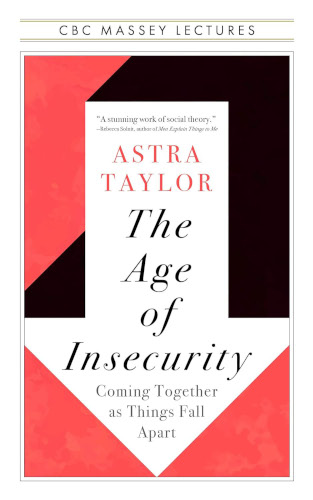Progressives need to talk and think much more about insecurity. Indeed, our failure to do so has been a ‘strategic mistake’.
So says author and activist Astra Taylor in this print version of her 2023 CBC Massey Lectures.
We all experience ‘existential insecurity’ as a core part of the human condition. We can all be wounded (physically and psychologically), we are all dependent upon others for our survival, and we will all die.
But, Taylor notes, we are all also ‘ensnared in systems that are structured to trigger insecurity, propelling us to strive for an ideal that we will always fall short of’.
Indeed, our highly competitive society makes ‘those ineffable and invaluable things that all human beings need and seek – connection, camaraderie, meaning, purpose, contentment, safety, self-esteem, respect... artificially scarce, despite the fact they don’t actually have to be in short supply.’
Moreover, this ‘manufactured insecurity’ is a core feature, not a bug, of our economic system, reflecting ‘a cynical theory of human motivation, one that says people will work only under the threat of duress, not from an intrinsic desire to create, collaborate, and care for one another.’
Taylor illustrates this with examples ranging from the enclosure of common land in England (beginning in the 12th century) to today’s tech giants.
Witness landowner Thomas Rudge in 1807, recommending that the hedges planted to fence-off enclosed land should not bear fruit. ‘[T]he idle among the poor are already too prone to depredation,’ he claimed and would be ‘still less inclined to work, if every hedge furnished the means of support’.
Or Facebook founder Mark Zuckerberg in 2022, informing employees that he was ‘turning up the heat’ to weed out those he considered to be underperforming.
As Taylor notes, manufactured insecurity also affects everyone, rich and poor, albeit in different ways.
Thus the phenomenon of ‘fractal inequality’ in which those in the top 10 percent of wealth envy the top 1 percent, the 1 percent envy the 0.1 percent, and so on.
Taylor illustrates this with the story of a woman who, following a substantial inheritance, had joined a network of wealthy people wanting to donate to social causes: ‘The main effect of coming to know other wealthy people, she told me, was that she felt poor and insecure by comparison.’
(Long ago, Adam Smith noted that: ‘Power and riches appear then to be, what they are, enormous and operose [laborious] machines contrived to produce a few trifling conveniences to the body, consisting of springs the most nice and delicate, which must be kept in order with the most anxious attention, and which in spite of all our care are ready every moment to burst into pieces, and to crush in their ruins their unfortunate possessor.’)
Many of the actions taken in the name of addressing our insecurities – privatisation of health care, mass incarceration, SUVs, the ‘war on terror’, nuclear weapons, and so on… – actually make us less secure.
But, Taylor argues, if we rethink the idea – crucially, distinguishing between existential insecurity and the manufactured variety – security ‘could cease to be a conservative concept aimed at fortifying one’s self and possessions against a hostile state and instead become a progressive principle, one that can help us make society more equitable and just.’
Indeed, ‘[t]he simple recognition of our mutual vulnerability – of the fact that we all need and deserve care throughout our lives – has potentially revolutionary implications.’
One of the many upsides of this approach is that it should also serve to undermine the current lurch towards far-right extremism in many parts of the world: ‘History shows that increased material security helps people be more open-minded, tolerant and curious, whereas rising insecurity does the reverse, causing dogmatism, rigidity, and bigotry to spike.’
As in her previous books (see PN 2644 – 2645 and 2657), Taylor draws on a huge variety of sources to make her arguments, ranging from classical myth and the 13th-century Charter of the Forest, to Franz Kafka’s office writings (for the Workers’ Accident Insurance Institute of the Kingdom of Bohemia) and the path-breaking scholarship of Virginia DeJohn Anderson (on the crucial role played by livestock in the colonisation of north America), Martha Jackman (on Canadian constitutional law) and Ronald Inglehart (on the origins of the 1960s social movements).
These being the Massey lectures (a Canadian institution) and Taylor herself having been born in Canada, there is also a welcome focus on Canadian examples, with a significant thread focusing on indigenous struggles.
Personal stories, etymological asides, inspiring examples, and some shocking factoids leaven the mix of this exceptionally rich work.
It’s a shame that there’s no index but, on the plus side, you can listen to the original lectures for free online:
www.tinyurl.com/ageofinsecurity
This is a must-read work for our ‘strange and scrambled political moment, at once prosperous and precarious, encouragingly open-minded and dangerously reactive’.
For, as US president Franklin Delano Roosevelt noted long ago: ‘There can be no security for the individual in the midst of general insecurity’.


